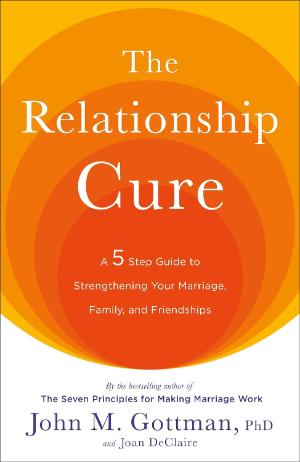
Intimacy is hard to define, but we all know when we're feeling it. Whether it's snuggling in companionable silence with your partner or crying on your best friend's shoulder, intimacy is when we feel connected.
How we humans build connections with each other, how we deepen them, and how we repair them when they fray is both as simple as a warm smile and as mysterious as the way the ground lurches when we see a picture of someone we have loved and lost.
John Gottman, one of the most influential researchers world-wide on family dynamics, has distilled the creating of intimate relationships down to their practical essence. It turns out that the building blocks of connection are the small overtures we make to each other every day, and the way our loved ones respond. Gottman calls these bids, as in "bids for attention." We could also call them overtures, as in opening movements. (You can find out more about John Gottman's work at the Gottman Institute website.)
In happy relationships, whether between romantic partners, parents and children, friends, or coworkers, bids are made and responded to warmly. It almost doesn't matter what the bid is about; the process of reaching out and receiving a response builds the relationship. It also increases the trust level so that we are more likely to reach out to that person again, and the content of the bids deepens.
If we begin with "I'm worried about XYZ" and receive an empathic response, we're likely to elaborate and maybe ask the other person for support. Our trust in reaching out is rewarded with caring. We both end the interaction feeling closer.
If, on the other hand, our comment is ignored, or greeted with anything that doesn't feel empathic, we're unlikely to make ourselves vulnerable, and the relationship loses a chance to deepen. In fact, we're hurt, so a little wall gets built.
The same process is enacted with our children in hundreds of daily interactions. If we ask our middle schooler about the upcoming school dance and receive an engaged response, we might venture further and ask whether she's nervous, to take the conversation to a deeper level. If, on the other hand, her response is surly, most of us will back off.
And, of course, our children often test us by saying something negative to see if we'll empathize. If we respond to their 'bid' with understanding, even though they're expressing negativity, they'll trust that we can handle their authentic feelings, and they'll open up more. If we ignore, deny their feelings, correct them or judge, they'll shut down.
If negative interactions are repeated often, kids get in the habit of hiding their feelings. Not only don't they reach out to us, but they more frequently reject our 'bids' to connect with them. So our ability to accept our child's emotions -- even when they're "negative" -- is the foundation of our child feeling seen and safe with us.
Here's how you can use these research findings to create a closer relationship with your child.
1. Whenever possible, respond to your child's bids to you.
The inconvenient thing about a bid from your child is that they initiate whenever they feel or want something, and you can count on being busy doing something else. It takes real self-discipline to tear yourself away from your phone to answer a child's question, but how you respond to his overture is crucial in building closeness. Later, when you try to get him to tell you about what happened at school today, that's your bid, and by then, he's shut down.
Want to try a powerful practice to support yourself in being more present and available? Make it a habit to turn off your devices when you're with your child. I know, that's a heavy lift. But kids often say that their parent's phone is more important to the parent than they are. You'll notice how your connection transforms.
If you can't be responsive at the moment to what your child is expressing, at least acknowledge that: "It sounds like you're worried about the recital. That sounds like a lot of pressure. Right now I really need to get to my meeting, but I hear how important this is to you. Can we talk about your recital when I get home tonight?" Your child won't be as interested in talking tonight as he is right now, but at least he heard that you cared, and maybe when you bring it up tonight, he won't shut the conversation down.
2. Train yourself to respond with empathy, no matter what the comment is.
If your child or teen climbs into the car after school and greets you with a negative comment like "Dad, you know I hate that music, can't we listen to my music?" or "Mom, I had a terrible day and it's all your fault because you...." that's a setup for an argument, and most of us will take the bait. Before we know it, there are raised voices and defensiveness, followed by surly silence and mutual resentment. Another brick in the wall between you and your child.
But maybe that was all a misunderstanding. Because the child or teen's comment is also a bid; she's actually asking if you'll commiserate with her, if you care about what matters to her, if you'll listen to her tale of woe so she can process all that upset, if you'll help her make things better.
You're only human, so naturally you feel attacked and you want to snap at her. But if you can take a deep breath and respond with empathy, you'll find you can turn the entire situation around. So you might say:
"Really, you don't like the Rolling Stones? My most favorite band of all time? I guess this IS a little loud....Okay, I'll turn this off and we can talk while we drive about what music to play, so we can find something we both like."
or
"Wow, you sound like you had a really terrible day! Tell me about it."
Later, of course, you can ask if she really thinks her terrible day was all your fault. She'll almost certainly sheepishly apologize. In the meantime, instead of a fight, you've deepened your relationship.
3. If you don't get the response you want when you reach out, step back and watch how you initiate.
Are you inviting a positive response? If what you want is connection, don't start with correction. Always connect before you correct or request.
4. If you make an overture and are greeted with something hurtful -- disdain, sarcasm, or blankness -- try not to respond with anger. Instead, acknowledge your vulnerability and hurt.
Say "Ouch!" and turn away (before you give in to the temptation to lash out.) Your child (or partner!) will almost certainly feel badly about having hurt you, especially since you haven't inflamed the drama by attacking back. Later, when you aren't feeling so hurt and angry, you can tell them how it made you feel to get that response.
Try to talk only about your feelings, not about them being wrong, and invite them to share any resentments that were driving their hurtful response to you. "Sweetheart, when you said that I always take your brother's side, I felt hurt because I try so hard to be fair, and your voice sounded so angry. But it sounds like you really think I'm being unfair. That must hurt you. Tell me more about that."
5. Make time in your daily routine for intimate interactions.
Often, we go whole days or even weeks just moving our kids through the schedule, without taking time to really connect. And most parents can't imagine where they would find more time to connect. So look for opportunities that are already in your schedule, where you can slow down and create an opportunity for closeness. Maybe that's when you help her with her hair in the morning, and take lots of time for hugs and kisses, or when you're in the car with just one child in the afternoon, or at bedtime when you lie with each child for ten minutes. Be sure you initiate good morning hugs and goodbye hugs. When you're with your child, turn off your device to allow the natural interactions of the moment to deepen between you.
Intimacy is a dance. It deepens or is eroded by every interaction we have. The good news? That means that every interaction you have is a chance to shift onto a positive track and deepen your connection to your loved ones. Just paying attention for a week to how you respond when your children reach out to you can shift the whole tone in your family.
Recommended Resources
PLEASE NOTE: These books are Amazon links with photos of the books. If you are not seeing them on your page, it may be that your browser is not picking them up, or Ad Blocker in Chrome is blocking the Amazon links. You can disable Ad Blocker just for this site if you like. Or you may want to try another browser. Enjoy!







